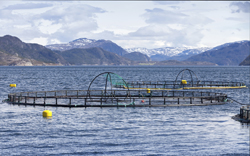Opening up possibilities for closed cages
Sea-based aquaculture already holds a prominent place in the European market, but a number of environmental factors have made the activity difficult to control. The EU-funded CLOSEDFISHCAGE project hence focused on the development of a closed, escape-proof, constant-volume, sea-based cage for fish farming. Such a cage would improve the competitiveness of small and medium-sized enterprises (SMEs) in the aquaculture sector, and help safeguard the production of quality fish at competitive prices. Major outcomes of the project included an enhanced scientific understanding of the biological, physical, operational and regulatory requirements for sea-based fish farming and a prototype cage. The prototype was 12 m in diameter, closed with a canvas, and had an inlet and outlet system. It could also continuously monitor essential water quality parameters. Scientists tested the prototype in real conditions at facilities in Brønnøysund, Norway. The system was then towed out to another location for intensified testing of waves and currents. It housed 100 salmon for approximately 6 months as an indication test for growth, welfare and health performance. Test results showed that the CLOSEDFISHCAGE prototype was stable and had structural integrity. It also proved to be more environmentally friendly than traditional cage nets. Other innovations of the CLOSEDFISHCAGE project included a very durable and flexible polymer plastic net pen, a predator guard and a control system. A prototype water treatment and control system was also developed and tested to ensure optimal water quality. Ultimately, the project resulted in the development of new technologies that could enable new possibilities and growth in sea-based aquaculture.



